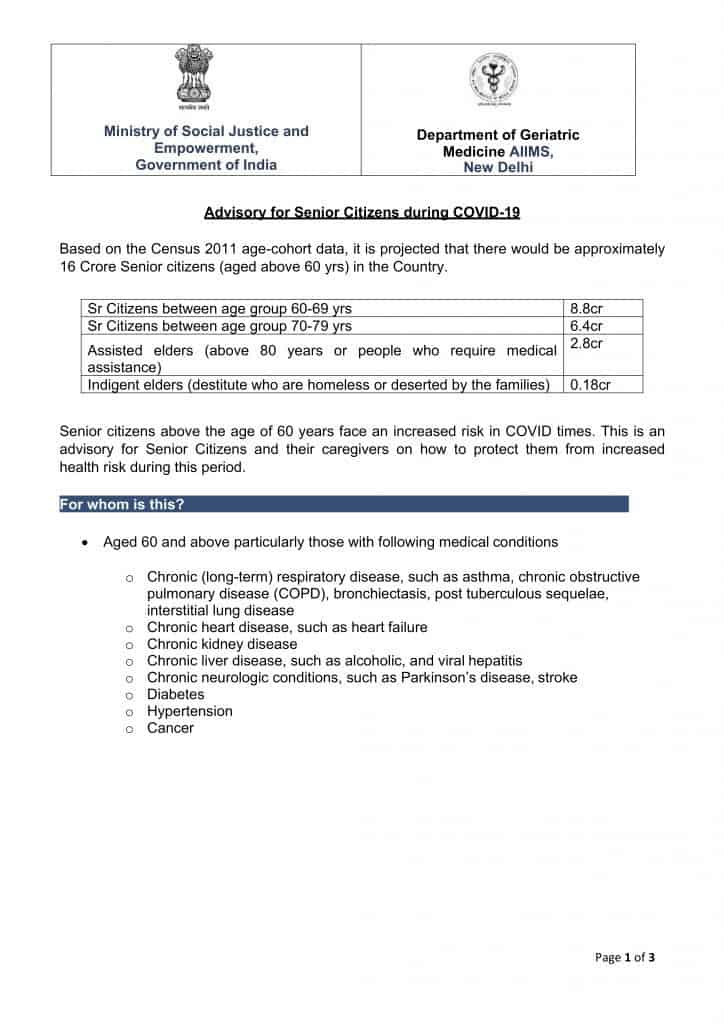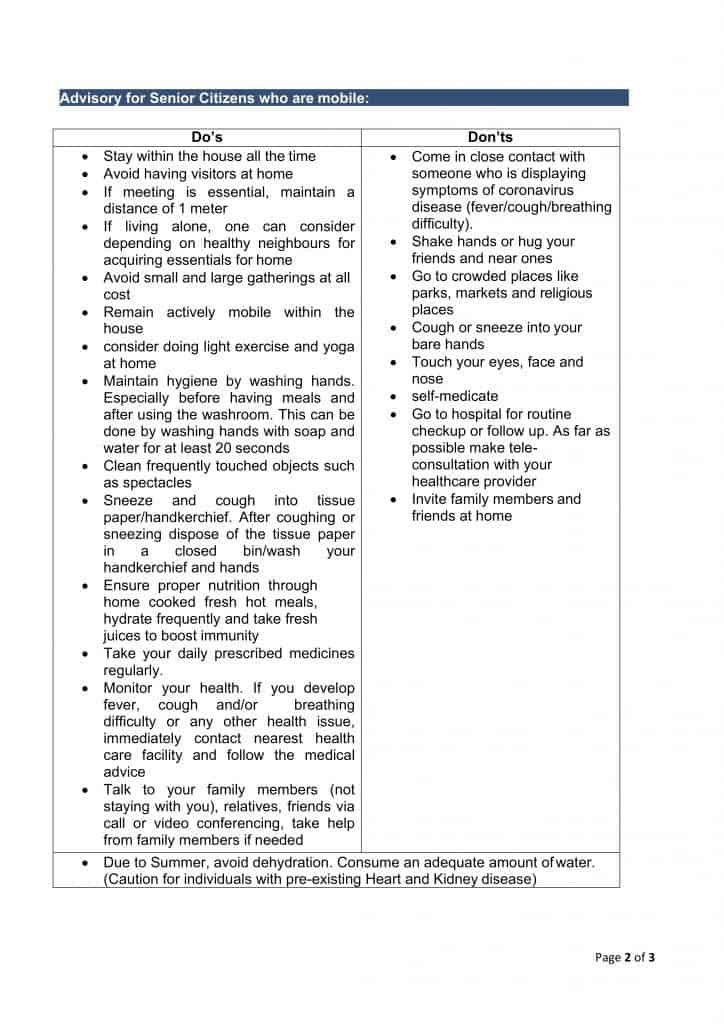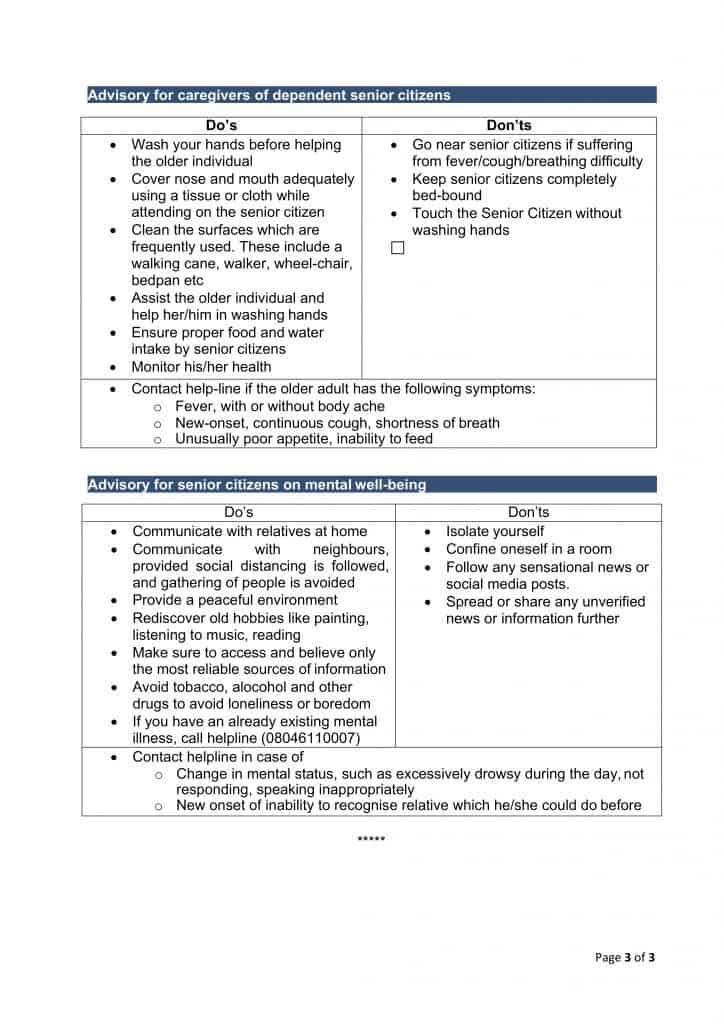In February 2020, Rangaswamy* (65) was admitted to a hospital in Tambaram Sanatorium due to respiratory issues. Soon after the lockdown was imposed, the hospital authorities discharged him, as he was on the road to recovery. He was prescribed medicines and was at home since March 24th with his wife Sundari* (60) and a college-going son. But soon, he suffered a relapse and his condition got serious.
Frantic calls to doctors for home consultation yielded no result and the senior citizen succumbed to a cardiac arrest on April 5th. “We tried reaching many doctors, but they were hesitant to come for home consultation. A nurse from the locality confirmed the death and helped us with the formalities,” shared a relative.
This might be an extreme incident, but it is indicative of what senior citizens in Chennai, and in many other cities, have been going through for nearly a month now. Ever since our busy roads turned eerily silent due to the imposition of the lockdown, senior citizens across the country, falling under the high-risk category, vulnerable to the novel coronavirus infection, have been confined to their homes and struggling to meet their many basic needs.
How are elders in Chennai coping in general?
Medical issues
Access to healthcare, among other things, remains the primary challenge for the senior citizen community. Due to the lack of facilities in hospitals and priority accorded to treatment of COVID-19, many patients are being sent home and private clinics remain shut too.
The medical fraternity does not encourage home consultation in normal situations and that holds true even now, during a pandemic, except in emergency cases. “During times like this, the out-patient departments are also closed and teleconsultation is encouraged. To treat anyone with respiratory symptoms without personal protective equipment (PPE) is risky for doctors now. It is advisable that patients keep their family doctors’ numbers handy to seek immediate help when needed,” said internal medicine specialist Dr Syed Hafeezullah.
The problem is acute for even those with serious non-COVID or non-respiratory illnesses — for example, those who need chemotherapy and dialysis. Those who suffer chronic ailments — such as aches and pains, or other orthopaedic issues are also left in the lurch if there is an aggravation. On the one hand, these elders are suffering and anxious, on the other, their cases do not fit the ’emergency’ label and they cannot go for therapy or the regular check-ups that they need.
Several NGOs, Bhoomika Trust being one, are coordinating with hospitals and ambulances for emergency treatment for senior citizens. They also attend to requests ranging from hospital visits for chemotherapy/dialysis to medicine delivery, teleconsulting, home nursing and caretaker resources.
The state government has also set-up a toll-free number for senior citizens: 1 800 425 0111
|
Help for the differently-abled The state government has set-up a toll-free numbers for the differently-abled: +91 97007 99993 (with WhatsApp video call facility) Persons with disabilities in need of essentials and medicines can contact Arun Bhaskar at +91 9940402225 or +91 9790747636 Those in need of tele-counselling on physical therapy can contact: Dr Hamsa Raj: +91 98402 3534 |
Food and essentials
Many senior citizens are worried about access to essentials (vegetables, groceries, medicines). Many of them are unaware of online delivery options or simply not comfortable. The Senior Citizens’ Group Of Besant Nagar (SCGOBN) is a group that has about 70 members. The President of the group, retired professor V Chandrasekhar (72), lives with his wife C Vijayalakshmi (65), away from their children. “I am on bed rest and have got sufficient medicines,” shares Chandrasekhar, “But, my wife is scared for my health. She cannot go out often and risk exposure.” Unaware of online delivery options or NGOs helping with delivery of essentials, the couple has simply stopped buying vegetables since the lockdown announcement.
Helplines for buying groceries and medicines
For help with government procedures
|
A lonely life
It is not always about food or medicines. Senior citizens, often separated from their kids, yearn to have conversations and companionship. Often it is their regular activity — a stroll in the park, neighbourhood grocery shopping, tea with friends — that provides them the mental succour they need. Confined to their houses, a majority of senior citizens today feel lonely and forlorn and are beginning to show signs of depression.
Chandrasekhar’s son and daughter are settled in the UK and Australia respectively. They call and check on their parents every day. However, the gloomy and silent house and the lack of human interaction is gradually robbing them of the will to continue living. “It is better to die than live such a lonely life,” he rues.
Fortunately several NGOs and other organisations realise this need and are trying to fill the gaps. Alserv, a Chennai-based company, that assists senior citizens in living an independent life, has witnessed a rising demand since the time of lockdown. They cater to medical and emergency, food and catering, safety and security, home maintenance and concierge needs.
“Although we have been fulfilling these needs, there are senior citizens who request us to just engage with them. They just ask us to call and check on them once or twice a day,” said Atul Jagadish, vice president, Business Development, Alserv, said. And so, the team is doing just that. A woman in her 60s from Egmore likes to discuss current developments and stay abreast of what’s happening. Before the lockdown, she would chat about such things with her maid and neighbours, but now she dials the Alserv helpline. “She calls us every day and speaks about news articles,” says Atul.
Karthik TM, a volunteer for several organisations, also talks about various instances when the senior citizen to whom he was delivering food invited him in and struck up conversations. On one such instance, he was travelling to Uthandi for food delivery. “I delivered the food to an elderly lady. She wanted me to stay back and dine with her. It was not just a kind gesture, it also spoke of her loneliness, exaggerated in these awful times,” said Karthik.
| The Tamil Nadu Association of Clinical Psychologists is offering mental health support in relation to the COVID-19 pandemic. Below are their numbers:
+91 94442 97058 +91 99402 11077 +91 98402 44405 +91 94443 59810 +91 98842 65958 +91 94493 65194 +91 84282 01968 +91 93838 45040 Mental health counselling by GCC: 044-26425585 |
Helping themselves
TCA Gopalakrishnan (77) and TCA Bama (71) are two senior citizens from Selaiyur who have kept loneliness and boredom at bay and have taken the lockdown in their stride. While Bama engages herself with cooking and household chores, her spouse, a creative personality, is busy writing jokes, reading, writing emails and creating art. “We have been living alone for four decades now and have not felt alone or depressed,” the couple shared.
A lot of elders who live with the spouse alone have turned to playing simple games like chess or snake and ladder, as most are not tech-savvy. People living with families are engaging with their grandchildren, spending time watching movies together and reliving the yesteryears, when they would have nila soru (eating on the terrace).
|
Government guidelines for senior citizens The Government of India has released an advisory for the welfare of the elderly community and their caretakers due to the COVID-19 crisis.
|
*Names changed on request



The content is elaborate. BUT THE PHONE NUMBERS EITHER THEY ARE SWITCHED OFF OR NOT REACHABLE.
Well, myself and my wife (both senior citizens and physically handicapped) live alone in Arumbakkam. We do not have the ration card. We are afraid to take the help of servant maid for fear of virus attack. Government repeatedly mentions that they are providing the basic necessities directly to the houses. For the last 60 days we are at home – not moved out. Where is this Government machinery to help us. All eyewash
THE ENTIRE LOCKED DOWN HAS HELPED US TO GET DEJECTED AND FRUSTRATED